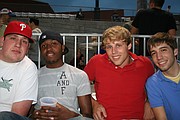BEIRUT (AP) - Syrian gunners pounded an opposition stronghold where the last dispatches from a veteran American-born war correspondent chronicled the suffering of civilians caught in the relentless shelling. An intense morning barrage killed her and a French photojournalist - two of 74 deaths reported Wednesday in Syria.
BBC correspondent Marie Colvin and photographer Remi Ochlik were among a group of journalists who had crossed into Syria and were sharing accommodations with activists, raising speculation that government forces targeted the makeshift media center, although opposition groups had previously described the shelling as indiscriminate. At least two other Western journalists were wounded.
Hundreds of people have died in weeks of siege-style attacks on Homs that have come to symbolize the desperation and defiance of the nearly year-old uprising against President Bashar Assad.
The Syrian military appears to be stepping up assaults to block the opposition from gaining further ground and political credibility with the West and Arab allies. On Wednesday, helicopter gunships reportedly strafed mountain villages that shelter the rebel Free Syrian Army, and soldiers staged door-to-door raids in Damascus, among other attacks.
The bloodshed and crackdowns brought some of the most galvanizing calls for the end of Assad's rule.
"That's enough now. The regime must go," said French President Nicolas Sarkozy after his government confirmed the deaths of Colvin, 56, and Ochlik, 28.
The U.S. and other countries have begun to cautiously examine possible military aid to the rebels. U.S. Secretary of State Hillary Rodham Clinton heads to Tunisia for a meeting Friday of more than 70 nations to look at ways to assist Assad's opponents, which now include hundreds of defected military officers and soldiers.
"This tragic incident is another example of the shameless brutality of the Assad regime," U.S. State Department spokeswoman Victoria Nuland said of the killing of the journalists.
In Saudi Arabia, the state news agency described King Abdullah scolding Russian President Dmitry Medvedev - one of Assad's few remaining allies - for joining China in vetoing a U.N. Security Council resolution this month condemning the violence.
But even Moscow said the ongoing bloodshed adds urgency for a cease-fire to allow talks between his regime and opponents.
Washington had strongly opposed arming anti-Assad forces, fearing it could bring Syria into a full-scale civil war. Yet the mounting civilian death tolls - activists reported at least 74 across Syria on Wednesday - has brought small but potentially significant shifts in U.S. strategies. It remains unclear, however, what kind of direct assistance the U.S. would be willing to provide.
The toppling of Assad also could mark a major blow to Iran, which depends on Damascus as its main Arab ally and a pathway to aid Iran's proxy Hezbollah in Lebanon.
"We don't want to take actions that would contribute to the further militarization of Syria because that could take the country down a dangerous path," White House press secretary Jay Carney said. "But we don't rule out additional measures if the international community should wait too long and not take the kind of action that needs to be taken."

